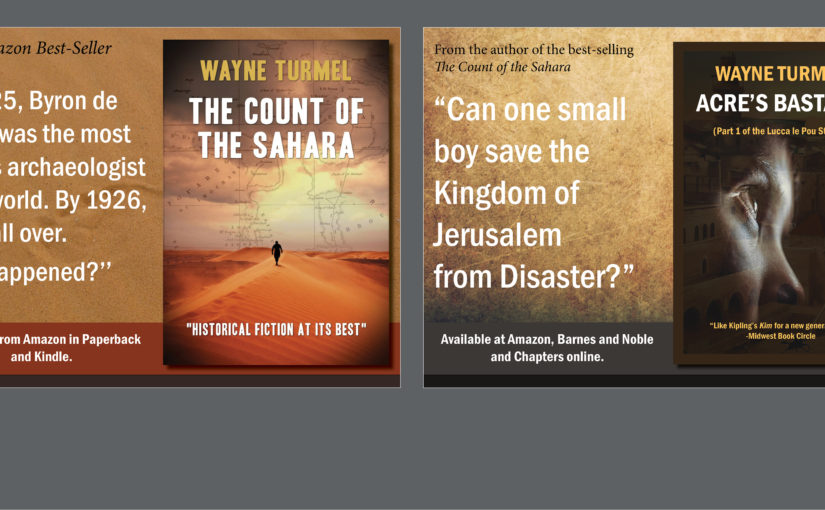One of my favorite things about historical fiction is that it exposes us to subjects that we didn’t know, or think we cared, about. For example, I didn’t know that French Canadians were the subject of hatred by the Klu Klux Klan in the early 20th Century. That’s where this week’s interview comes in. Mark Alan Leslie is the author of The Crossing.
Okay, so let’s start with the obvious. What’s your deal, Mark?
 After 25 years writing golf magazine pieces for Sports Illustrated, Links, GOLF, Golf Course News and others — and winning a half dozen national writing awards along the way — I turned my time to something else I enjoy: history. Since then I’ve written three historical novels and three contemporary thrillers. The historical works are The Crossing about the Ku Klux Klan in Maine in the 1920s, True North: Tice’s Story about the Underground Railroad, and Midnight Rider for the Morning Star about America’s first circuit-riding preacher, Francis Asbury. Each book is loaded with action and adventure — and historical facts many of us have never heard or read about.
After 25 years writing golf magazine pieces for Sports Illustrated, Links, GOLF, Golf Course News and others — and winning a half dozen national writing awards along the way — I turned my time to something else I enjoy: history. Since then I’ve written three historical novels and three contemporary thrillers. The historical works are The Crossing about the Ku Klux Klan in Maine in the 1920s, True North: Tice’s Story about the Underground Railroad, and Midnight Rider for the Morning Star about America’s first circuit-riding preacher, Francis Asbury. Each book is loaded with action and adventure — and historical facts many of us have never heard or read about.
What’s your latest book, The Crossing about?
“As Maine goes, so goes the nation” was a motto of the early 1900s and the Ku Klux Klan determined that if it could grab a foothold in the bellwether northeasternmost state, it could succeed anywhere. So it sent its most charismatic recruiter to draw the crowds. He succeeded… for a while. One of his successes in this work of fiction is Cooper’s Crossing, a very close-knit town — close, that is until the Klan arrives.
The Crossing takes us into the dangers and intrigues of this scenario. The charismatic KKK leader is pit against a magnetic pastor, and townsmen against townsmen, culminating in a battle of brawn, and the spirit, when a French-Canadian crew of lumberjacks arrives.
Because when you think rollicking action, Canadian lumberjacks is what comes to mind. I’m kidding, but as someone with French-Canadian roots, I am a bit surprised. After all, aside from Toronto hockey fans and Alberta oil workers, who doesn’t like French Canadians? What is it about this period in history that caught your attention?
Maine students have never been taught about this time when the KKK helped elect a governor as well as several mayors of prominent cities, the President of the Maine Senate and many others.
The whole idea intrigued me: How could a racist group thrive in a state with only a handful of black people? Well, they found others to hate, focusing on Jews and Catholic immigrants from Ireland, Poland and Canada who were “taking our jobs and with allegiance to a Pope a world away instead of our own government.”
It sounds trite to say, “haters gonna hate,” but history shows if you’re looking for a scapegoat, you’ll usually find one, even if you have to make it up. Without giving away spoilers, what’s your favorite scene in the book?
My favorite character, lumberjack Jigger Jacques, and his crew arrive in town![The Crossing: A Historical Novel by [Leslie, Mark Alan]](https://images-na.ssl-images-amazon.com/images/I/51knS9fPV6L.jpg) and are ambushed by Klansmen on horseback at the same time the town’s pastors are meeting nearby with embattled townspeople about the Klan. The dichotomy is powerful: brutal physical fighting at the mill versus peacemaking at the church.
and are ambushed by Klansmen on horseback at the same time the town’s pastors are meeting nearby with embattled townspeople about the Klan. The dichotomy is powerful: brutal physical fighting at the mill versus peacemaking at the church.
If people want to learn more about this book, or any of your work, where can they go?
People can find my books at:
And fine bookstores
They can reach me at:
E-mail: gripfast@roadrunner.com
Blog: https:/thrillofthequillblog.wordpress.com/
Subscribe to my newsletter and get a chance to win a signed paperback copy of Acre’s Bastard. Each month you’ll receive links to interviews with great authors, news about upcoming events and previews of my work in progress, Acre’s Orphans. Look at the bottom left of the page for the sign-up sheet. No spam, just once a month updates and a chance to learn about great new Historical Fiction of all types from around the world.
